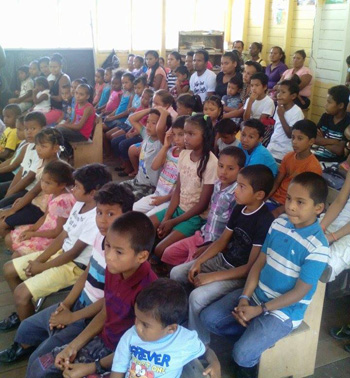– Vanessa Braithwaite takes a look at life beyond the shores of Linden
WAY down the immense jungles of the county of Demerara, beyond sandy hills and robust, rugged rapids of the deep, dark Demerara river, is a speck of livelihood in a place where one can enjoy pure serenity. There the air is fresh and the people are warm. It is a place fitted for a getaway from the mundane activities of life, where appreciation for simple things lies. The place is called Malali, and it is considered ‘an oasis’ in the thick vegetation that adorns both banks of the Demerara River. Snugly situated approximately 50 miles from Linden, this little Amerindian Reservation comprises about 235 Amerindians from the Arawak tribe.
The place is called Malali, and it is considered ‘an oasis’ in the thick vegetation that adorns both banks of the Demerara River. Snugly situated approximately 50 miles from Linden, this little Amerindian Reservation comprises about 235 Amerindians from the Arawak tribe.
Occupying both sides of Rio Demerara, with the central point being on the right, Malali’s main mode of transportation is by boat; and it’s not unusual to see a little lad rushing into his little canoe to run an errand for his mom at the only grocery shop, located at the central point of the village. The central point also comprises a guest house, a health post, the lone grocery shop, a playground, teachers’ quarters and a village office.
The 45 children who attend the willage’s primary and nursery schools do so by boat. The building which houses both schools is managed by four teachers. The headmistress is a native of Malali, the other two are trained teachers from Linden, while the fourth is a Canadian volunteer.
With the absence of a secondary school, the children are forced to temporarily leave their families and seek secondary education in Linden. In most cases, after experiencing life in the township, they do not return to the shelter of Malali.
The main economic activities for villagers are logging and subsistence farming. Once children complete secondary schooling, the youths often remain out of Malali to seek other employment opportunities, according to Toshao Willbert Hall.
This Toshao has been serving the village in that capacity for the past 21 years. He is a native of Malali, and is also an executive member of the National Toshao’s Council, representing Region 10. Speaking exclusively with this publication, Toshao Hall related the difficulties being faced by loggers to source markets for their timber, and in transporting it to those markets.
Surrounded by rough terrain, Malali loggers face great pressure to sail the logs all the way downriver. The Toshao said there are two miles of rapids and waterfalls from the river upwards, and this requires excessive effort to get the lumber past the falls.
“In the dry (season) it is very difficult, because you have to pull it over a mile through the road, and that brings on extra expense; since you have to sail to the falls, then pull it over the road, tie it up again and sail it through the rest of the river,” he said. In the rainy season, however, it is not that difficult, as only one sailing is required.
The villagers also engage in fishing, hunting and farming. Despite their hardships, the villagers assemble to enjoy a few outdoor games once in a while. The village sports coordinator would arrange for competitions to be held in softball cricket, volleyball and football every two months. Only recently, at the Region 10 Youth Award, the Malali football team was honoured for its excellent contribution in football competitions within the region.
Apart from this, the villagers would host their annual Amerindian Heritage celebrations.
Many may wonder how is it that the residents of Malali secure food on a daily basis. According to the Toshao, the villagers are skilled in Amerindian food preservation methods. Moreover, loggers would do bulk shopping of vegetables and fruits on their fortnightly trips to Linden. The villagers would make use of this, in addition to the produce from their subsistence farming.
Surrounded by water, waterfalls and forest, life can be difficult for the people of Malali. Those who cannot afford a boat, even a little canoe, can find themselves being stuck at home if they do not secure a boat ride from a neighbour. In cases of emergency, this can be an especially difficult situation, and can result in serious consequences, as occurred in the past.
According to Toshao Hall, the villagers would greatly appreciate being given a service boat for their community, because it would especially benefit residents who do not own their own boats. They are kindly asking government to consider their case.
“The Government can even just give us an engine, and we can build our own boat,” the toshao said.
In addition to this, the lack of transportation affects the mailing service, as there is not a regular distribution of mail. The villagers are fortunate to have the necessary commodities, such as water, solar electricity power, telephone service, and even Internet service.
Despite all its hardships, Malali, that speck of livelihood in the forest, is indeed a wonderful place of peace and tranquility.




.png)









